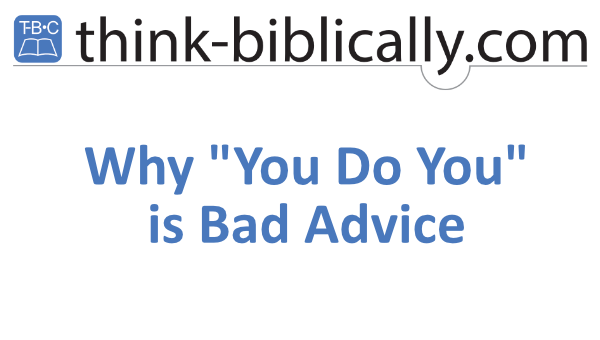By Tyson Thorne

A phrase has been made increasingly popular through commercials and celebrity usage: “you do you” sounds liberating -- who wouldn’t want to do what they want to? Most people want to live life on their own terms. I challenge you to think a little deeper, however. The Bible says there is nothing new in this world (Ecclesiastes 1.9) so we should expect that this philosophy has been tried before. What were the results? The Bible has something to say about that too.
The book of Judges tells a story in chapter 17.1-.7. Here we find a woman who had been robbed of 1100 pieces of silver. One day her son confesses to stealing it and gives it back to her. We should note that this guy stole from his own mom, so he’s not a good guy to begin with. Second, when he gives it all back to her it isn’t because he felt guilty it is because he learned his mother cursed the silver and whomever took it. He didn’t want to fall under a curse. Again, he’s completely selfish.
The mother’s reaction is a little hard to comprehend. She is understandably thrilled to have her savings back, but she rewards her son by using 200 of the coins to have two idols fashioned and gives them to him. The son is delighted, appoints himself and his son as priests and begins to serve the idol. Now this family isn’t Canaanite or Philistine, they are Israelites and know better. So why did they do all these terrible things? The author tells us in verse six: “In those days Israel had no king. Each man did what he considered to be right in his own eyes.” In other words, the son was following the rule of “you do you.”
When a person becomes a law unto himself, when a person becomes the arbiter of morality, he behaves selfishly which leads him and those around him to ruin.
One criticism often made of the church (and Christianity more generally) is there are too many “rules”. The truth is those rules are not a religious rite nor are they intended to oppress people. God’s law is given to us as a standard for morality and ethics. Those who heed his law not only understand their place in the world but how best to relate to God and others. It keeps us from making the selfish mistakes brought about by such philosophies as “you do you”.
What happens when the people of a society all adopt the “you do you” way of life? You end up with all the horrors found in the book of Judges. The phrase used at the end of our story isn’t used just that once. The author uses the same words to end the book. He uses it as an indictment of his people, as a cautionary tale to the future kingdom of Israel, and as a warning to us.
|
|